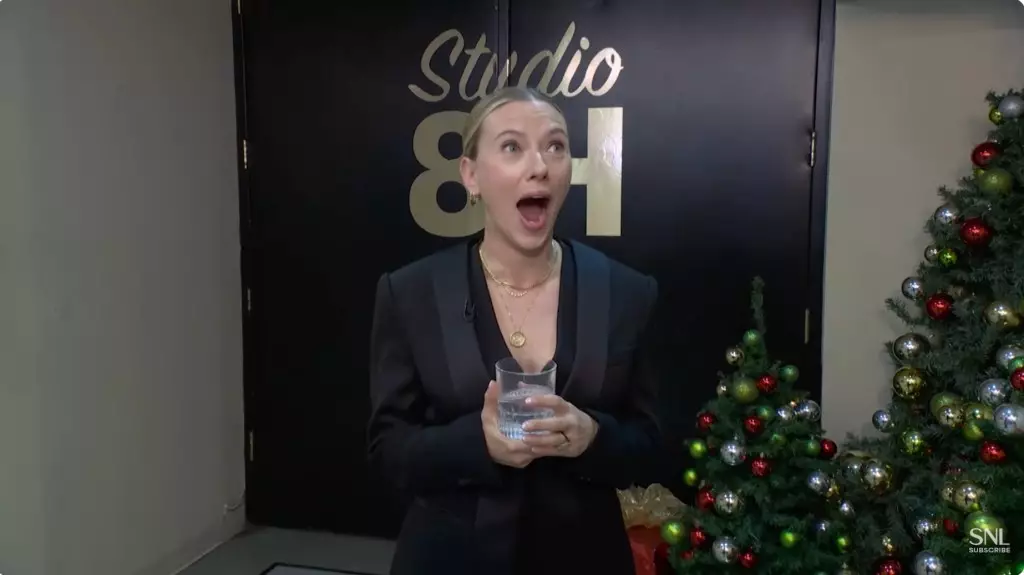In the realm of live comedy, few shows manage to balance celebrity culture with razor-sharp humor quite like **Saturday Night Live (SNL)**. The show is a breeding ground for political satire, social commentary, and off-the-wall sketches that reflect the zeitgeist. Recently, a segment from the show known as the “Joke Swap”—featured prominently during the Weekend Update—has garnered attention for its brutal execution. The segment, often starring Colin Jost and his co-host Michael Che, entails a rapid-fire exchange of harsh jokes that the partners have written for each other. This playful yet unforgiving format becomes more complex when the target of the humor happens to be a loved one, as was the case when Jost’s wife, Scarlett Johansson, was in the audience.
Jost’s revelations during a recent episode revealed the added layer of tension that comes with targeting a spouse in this comedic setting. Scarred by previous iterations of the Joke Swap, Johansson openly admitted her dread regarding these segments where her husband often bears the brunt of the criticism. The very nature of these jokes veers toward the inappropriate, creating a discomfort that is palpable when watched. The fact that the audience ultimately gets to witness Johansson’s reactions—caught between cringe-inducing humor and her husband’s comic perseverance—only amplifies the stakes of their playful dynamic.
The latest Joke Swap reached a new level of audacity and controversy, which exemplified SNL’s irreverent style. One particular moment highlighted this fact when Jost was made to deliver jokes that trivialized sensitive topics, including slavery reparations. Such humor typically walks a narrow line, testing societal norms while reflecting the irreverent ethos of contemporary comedy. Despite the audience’s mixed reactions—from laughter to sheer disbelief—the risks associated with these jokes raise questions about the appropriateness of humor, especially in a live context.
At one point, Jost referred to Johansson’s recent milestone birthday in an edgy way, teasing about impending doom for their relationship. Comments about their recent child veered into dangerously inappropriate territory as Jost attempted to leverage the latest media frenzy regarding celebrity parenting. The audience’s mixed reactions revealed not just amusement but also discomfort—emphasizing how dark humor can elicit varied responses depending on the subjects involved.
Furthermore, Che’s contributions to the segment underscored the rising stakes of famous personalities making jokes that delve deep into troubling waters. His comments referencing Moana and inappropriate youth relationships brought its own wave of backlash, questioning the boundaries of taste in humor.
Johansson’s candid reflections on the Joke Swap evoke an understanding of the emotional toll that comes with being the punchline, especially when intertwined with personal relationships. In interviews, she described feeling as though it may be necessary for her to enter “witness protection” following those episodes—an exaggeration that highlights the vulnerability celebrities experience under the comedic lens. The atmosphere during these segments evolves rapidly, morphing from lighthearted jest to something more unsettling.
Humor often takes on greater significance beyond entertainment: it can serve as a chewing ground for unresolved societal tensions and personal conflicts within relationships. The juxtaposition of public persona with personal reality is stark when actors like Johansson become unwilling participants in their partner’s stand-up routines. Reflecting upon the value of comedy within a marriage invites exploration of the balance between professional ambition and the inherent risks involved.
Ultimately, the Joke Swap serves multiple purposes beyond mere entertainment. Choosing to confront uncomfortable subjects through humor transforms the segment into a social commentary on race, relationships, and the complexity of life in the public eye. While it provokes laughter, it also inspires introspection regarding the nature of comedic expression and the boundaries that may or may not exist.
As audiences cling to the palpable dynamism between Jost and Che, they are likewise drawn to the intimate spaces where personal and public life collide. Therefore, the ever-evolving nature of humor—not just its comedic delivery—has a pivotal role in reconstructing narratives around race, intimacy, and human experience. The Joke Swap stands as a testament to the unpredictable landscape of humor in contemporary society, spotlighting the ciphers embedded within comedy and the personal lives of those who dare to step on that stage.

Leave a Reply